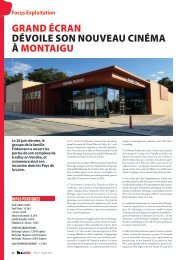Create successful ePaper yourself
Turn your PDF publications into a flip-book with our unique Google optimized e-Paper software.
: March<br />
.*<br />
THE COMPROMI^b<br />
American companies will be allowed remittances of<br />
$17,000,000 a year, and retain profits on British films shown in this country. A plan is<br />
being prepared to determine how receipts remaining in Great Britain may be spent.<br />
Export of new U.S. films to England begins April 1. Remittances to U.S. begin June 14.<br />
BRITISH SITUATION SETTLED<br />
AND BOTH SIDES ARE PLEASED<br />
NEW YORK—American film exports to<br />
Great Britain will be resumed April 1.<br />
The British 75 per cent tax will be rescinded.<br />
For the next two years American companies<br />
will be allowed to remit $17,000,000<br />
per year to this country and will be permitted<br />
to retain the profits on British films<br />
shown here.<br />
The agreement is for four years and it<br />
will be reviewed at the end of two years for<br />
adjustment to any changes that may have<br />
taken place in the condition of British<br />
finances.<br />
U.S. TO GET ABOUT $22,000,000<br />
Depending upon how much profit is turned<br />
in by British films here, the American industry<br />
may be able to collect something less than<br />
half of its estimated total of $48,000,000 from<br />
the<br />
British market.<br />
All money over the $17,000,000 taken in in<br />
England will be held there.<br />
Last year earnings of British films in this<br />
country were about $4,000,000. An optimistic<br />
estimate for the year starting in June is $5,-<br />
000,000. If this pans out, total income from<br />
British market—the $17,000,000 remitted plus<br />
the income from British films here—would<br />
reach about $22,000,000.<br />
Under the terms of the agreement the<br />
money blocked in Great Britain can be used<br />
in various ways. Distribution charges for<br />
American pictures over there average about<br />
25 per cent, so this would use up about $12,-<br />
000,000 of the estimated blocked income. A<br />
clause in the agreement will permit American<br />
distributors to pay British talent hired over<br />
there for American production out of such<br />
funds. These funds also can be used for purchase<br />
of scripts, production in England and<br />
investment in film companies and theatres.<br />
COMPANIES PLAN EXPANSION<br />
Use of some funds may be allowed for investments<br />
not directly coimected with the<br />
film industry.<br />
Details of these arrangements are still to<br />
be worked out. Technical advisers will handle<br />
these negotiations.<br />
The agreement was formally signed Friday<br />
morning.<br />
A new quota law is now under consideration<br />
by the house of lords and is nearing<br />
enactment.<br />
The British tax Is expected to go off April<br />
1 and the arrangement for remittances will<br />
start June 14, Exports of film will begin<br />
from this country as soon as the tax goes<br />
off.<br />
The plan was agreed upon Wednesday<br />
afternoon, March 10, at a conference of<br />
'Democratic' Deal<br />
"This is by no means a Johnston<br />
agreement or a British agreement,<br />
but a democratic<br />
compromise,"<br />
Eric<br />
Johnston,<br />
president of<br />
the Motion<br />
Picture Ass'n<br />
of America,<br />
declared in a<br />
statement released<br />
shortly<br />
after the settlement<br />
was<br />
Eric Johnston<br />
announced.<br />
"Once again there will be a free<br />
flow of films between the United<br />
Stales and Great Britain and we<br />
avoid the consequences of a dangerous<br />
precedent."<br />
Johnston also added that the<br />
agreement will avoid any adverse<br />
effects on British economy and<br />
would keep Hollywood a flourishing<br />
and going concern.<br />
Discussing the compromise w^ith<br />
BOXOFFICE over transatlantic<br />
telephone, the MPAA president<br />
said he was pleased to learn the<br />
immediate reaction in the United<br />
States was favorable.<br />
American representatives headed by Eric<br />
Johnston, MPAA president, and Harold Wilson,<br />
president of the British Board of Ti-ade.<br />
It was presented to the house of commons<br />
by Wilson Thursday afternoon at 3 o'clock.<br />
Parliamentary action was required in order<br />
to rescind the tax.<br />
^<br />
In the meantime, the details were telephoned<br />
to this country with instructions that<br />
they should be kept secret until Wilson had<br />
had time to present them to the house of<br />
commons.<br />
Francis Harmon, vice-president of the<br />
MPAA, called a meeting of company heads<br />
and foreign department executives at the<br />
MPAA offices and the word spread like a<br />
prairie fire. During the meeting calls were<br />
made to executives in Florida and Hollywood<br />
in order to test sentiment. It was generally<br />
agreed that the settlement was a good compromise.<br />
Newspaper men arrived at the MPAA offices<br />
while the meeting was convening and<br />
saw executives entering. Harmon blandly<br />
denied any meeting was in progress and<br />
ordered the heavily loaded coat racks in the<br />
reception room taken into the board of<br />
directors room.<br />
From that time on Harmon could not be<br />
reached. Even the Washington headquarters<br />
of the MPAA received his orders for silence.<br />
TO STIMULATE DISTRIBUTION<br />
One effect of the agreement, it was agreed,<br />
would be the stimulation of efforts to secure<br />
distribution of British pictures here. With<br />
only about a third of the total British revenue<br />
reaching this country, the American distributors<br />
will still be pinched, even though<br />
the books show British deposits. The situation<br />
is greatly eased, however, and all executives<br />
agree that this settlement will have a<br />
tendency to halt some of the restrictions in<br />
other countries that began pihng up.<br />
Barney Balaban, Paramount president, on<br />
vacation in Florida said he was "delighted"<br />
with the settlement, because the American<br />
industry had suffered a 4.9 per cent decrease<br />
in foreign revenue which had wiped out<br />
profits. Further economies in production and<br />
distribution costs will be made between now<br />
and June 14 when the agreement goes into<br />
effect, he said.<br />
Arthur Loew, president of Loews International,<br />
sounded the only critical note in the<br />
chorus of satisfaction. He said there could<br />
have been a more equitable remittance arrangement.<br />
On the coast Floyd B. Odium, head of<br />
Atlas Corp., said he was not going to express<br />
any enthusiasm until he found out more<br />
about the details. Sam Goldwyn said he<br />
could not decide how satisfactory the deal<br />
was until he fomid out more about it.<br />
STRONG MARKET REACTION<br />
The stock market reacted strongly to the<br />
Thursday morning news flash from London.<br />
Film stocks were strong. Eighteen thousand<br />
shares of Paramount were sold and they went<br />
up a point to 20':, Warner Bros, advanced<br />
one-half point on sales of 10,900 shares, 20th-<br />
Fox was up three-eighths to 21's, Loews up<br />
Vi to n^i and RKO up 'i to 8''a.<br />
At a press interview in London Friday<br />
morning, Wilson said that American production<br />
in Great Britain would increase and<br />
Johnston optimistically indicated he hoped<br />
American companies eventually would be able<br />
to get most of their money out in some form.<br />
A representative for MGM said his company<br />
would start building new studios as soon as<br />
possible and a Warner Bros, representative<br />
said his company would extend its studio facilities<br />
in England and rent space to others.<br />
BOXOFFICE<br />
:<br />
13, 1948

















